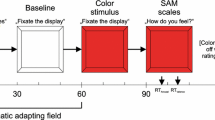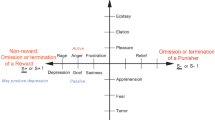Abstract
The purposes of this study are to determine whether subjective assessment of reactivity level in rhesus macaques, between 1 and 14 years old, is related to assessment of personality traits and whether a configuration of personality traits most salient for assessment of reactivity can be defined. Results indicate that subjective assessment of reactivity is complementary to that of personality traits. Interrater reliability and convergent validity are established. Principal-component and discriminant analyses of the present data show that 10 personality traits can assign all' subjects to reactivity level, but as few as 3 traits may be sufficient.
Similar content being viewed by others
References
Buirski, P., Kellerman, H., Plutchik, R., Weininger, R., and Buirski, N. (1973). A field study of emotions, dominance, and social behavior in a group of baboons (Papio anubis).Primates 14: 67–68.
Buirski, P., Plutchik, R., and Kellerman, H. (1978). Sex differences, dominance, and personality in chimpanzees.Anim. Behav. 26: 123–129.
Caine, N., Earle, H., and Reite, M. (1983). Personality traits of adolescent pig-tailed monkeys (Macaca nemestrina): An analysis of social rank and early separation experience.Am. J. Primatol. 4: 253–260.
Chamove, A., Eysenck, H., and Harlow, H. (1972). Personality in monkeys: Factor analyses of rhesus social behavior.Q. J. Exp. Psychol. 24: 496–504.
Higley, J., and Suomi, S. (1989). Temperamental reactivity in nonhuman primates. In Kohnstamm, G., Bates, J., and Rothbart, M. (eds.),Temperament in Childhood, John Wiley & Sons, New York, pp. 153–167.
Kagan, J., Reznick, J., and Sniderman, N. (1986). Temperamental inhibition in early childhood. In Plomin, R., and Dunn, J. (eds.),The Study of Temperament, Lawrence Erlbaum Associates, Hillsdale, NJ, pp. 53–63.
Kleinbaum, D., Kupper, L., and Muller, K. (1988).Applied Regression Analysis and Other Multivariate Methods, PWS-Kent, Boston.
Martau, P., Caine, N., and Candland, D. (1985). Reliability of the Emotions Profile Index, Primate form, withPapio hamadryas, Macaca fuscata, and twoSamimiri species.Primates 26: 501–505.
Nash, V., and Chamove, A. (1981). Personality and dominance behavior in stumptailed macaques.Selected Papers (Part B) of the VIIIth Congress of International Primate Society; International Primate Society, Florence, Italy, pp. 88–92.
Novak, M., O'Neill, P., and Suomi, S. (1991). Back to the field: Social propensities of lab-born rhesus monkeys (in preparation).
O'Neill, P. (1989). A room with a view for captive primates: Issues, goals, related research, and strategies. In Segal, E. (ed.).Housing, Care, and Psychological Wellbeing of Laboratory and Captive Primates, Noyes, New York, pp. 616–625.
Raleigh, M., McGuire, M., and Brammer, G. (1989). Subjective assessment of behavioral style: Links to overt behavior and physiology in vervet monkeys.Am. J. Primatol. 18: 161–162.
Reite, M., and Short, R. (1980). A biobehavioral developmental profile (BDP) for the pigtailed monkey.Dev. Psychobiol. 13: 243–285.
Stevenson-Hinde, J., and Zunz, M. (1978). Subjective assessment of individual rhesus monkeys.Primates 19: 473–482.
Stevenson-Hinde, J., Stillwell-Barnes, R., and Zunz, M. (1980). Subjective assessment of rhesus monkeys over successive years.Primates 21: 66–88.
Suomi, S. (1987). Individual differences in rhesus monkey behavioral and adrenocortical responses to social challenge: Correlations with measures of heart rate variability. In Fox, N. (chair), Heart Rate Variability and Social Behavior: Behavioral and Biological Correlates, Symposium conducted at the meeting for the Society for Research in Child Development, Baltimore, MD, 1987.
Author information
Authors and Affiliations
Rights and permissions
About this article
Cite this article
Bolig, R., Price, C.S., O'Neill, P.L. et al. Subjective assessment of reactivity level and personality traits of rhesus monkeys. International Journal of Primatology 13, 287–306 (1992). https://doi.org/10.1007/BF02547817
Received:
Revised:
Issue Date:
DOI: https://doi.org/10.1007/BF02547817




